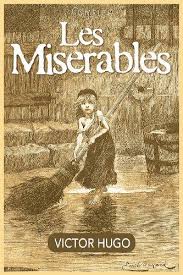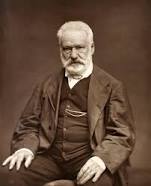Les Misérables Page #11
Les Misérables is a French historical novel by Victor Hugo, first published in 1862, that is considered one of the greatest novels of the 19th century. In the English-speaking world, the novel is usually referred to by its original French title.
The Bishop clapped his hands. "That's talking!" he exclaimed. "What an excellent and really marvellous thing is this materialism! Not every one who wants it can have it. Ah! when one does have it, one is no longer a dupe, one does not stupidly allow one's self to be exiled like Cato, nor stoned like Stephen, nor burned alive like Jeanne d'Arc. Those who have succeeded in procuring this admirable materialism have the joy of feeling themselves irresponsible, and of thinking that they can devour everything without uneasiness,--places, sinecures, dignities, power, whether well or ill acquired, lucrative recantations, useful treacheries, savory capitulations of conscience,--and that they shall enter the tomb with their digestion accomplished. How agreeable that is! I do not say that with reference to you, senator. Nevertheless, it is impossible for me to refrain from congratulating you. You great lords have, so you say, a philosophy of your own, and for yourselves, which is exquisite, refined, accessible to the rich alone, good for all sauces, and which seasons the voluptuousness of life admirably. This philosophy has been extracted from the depths, and unearthed by special seekers. But you are good-natured princes, and you do not think it a bad thing that belief in the good God should constitute the philosophy of the people, very much as the goose stuffed with chestnuts is the truffled turkey of the poor." CHAPTER IX--THE BROTHER AS DEPICTED BY THE SISTER In order to furnish an idea of the private establishment of the Bishop of D----, and of the manner in which those two sainted women subordinated their actions, their thoughts, their feminine instincts even, which are easily alarmed, to the habits and purposes of the Bishop, without his even taking the trouble of speaking in order to explain them, we cannot do better than transcribe in this place a letter from Mademoiselle Baptistine to Madame the Vicomtess de Boischevron, the friend of her childhood. This letter is in our possession. D----, Dec. 16, 18--. MY GOOD MADAM: Not a day passes without our speaking of you. It is our established custom; but there is another reason besides. Just imagine, while washing and dusting the ceilings and walls, Madam Magloire has made some discoveries; now our two chambers hung with antique paper whitewashed over, would not discredit a château in the style of yours. Madam Magloire has pulled off all the paper. There were things beneath. My drawing-room, which contains no furniture, and which we use for spreading out the linen after washing, is fifteen feet in height, eighteen square, with a ceiling which was formerly painted and gilded, and with beams, as in yours. This was covered with a cloth while this was the hospital. And the woodwork was of the era of our grandmothers. But my room is the one you ought to see. Madam Magloire has discovered, under at least ten thicknesses of paper pasted on top, some paintings, which without being good are very tolerable. The subject is Telemachus being knighted by Minerva in some gardens, the name of which escapes me. In short, where the Roman ladies repaired on one single night. What shall I say to you? I have Romans, and Roman ladies [here occurs an illegible word], and the whole train. Madam Magloire has cleaned it all off; this summer she is going to have some small injuries repaired, and the whole revarnished, and my chamber will be a regular museum. She has also found in a corner of the attic two wooden pier-tables of ancient fashion. They asked us two crowns of six francs each to regild them, but it is much better to give the money to the poor; and they are very ugly besides, and I should much prefer a round table of mahogany. I am always very happy. My brother is so good. He gives all he has to the poor and sick. We are very much cramped. The country is trying in the winter, and we really must do something for those who are in need. We are almost comfortably lighted and warmed. You see that these are great treats. My brother has ways of his own. When he talks, he says that a bishop ought to be so. Just imagine! the door of our house is never fastened. Whoever chooses to enter finds himself at once in my brother's room. He fears nothing, even at night. That is his sort of bravery, he says. He does not wish me or Madame Magloire feel any fear for him. He exposes himself to all sorts of dangers, and he does not like to have us even seem to notice it. One must know how to understand him. He goes out in the rain, he walks in the water, he travels in winter. He fears neither suspicious roads nor dangerous encounters, nor night. Last year he went quite alone into a country of robbers. He would not take us. He was absent for a fortnight. On his return nothing had happened to him; he was thought to be dead, but was perfectly well, and said, "This is the way I have been robbed!" And then he opened a trunk full of jewels, all the jewels of the cathedral of Embrun, which the thieves had given him. When he returned on that occasion, I could not refrain from scolding him a little, taking care, however, not to speak except when the carriage was making a noise, so that no one might hear me. At first I used to say to myself, "There are no dangers which will stop him; he is terrible." Now I have ended by getting used to it. I make a sign to Madam Magloire that she is not to oppose him. He risks himself as he sees fit. I carry off Madam Magloire, I enter my chamber, I pray for him and fall asleep. I am at ease, because I know that if anything were to happen to him, it would be the end of me. I should go to the good God with my brother and my bishop. It has cost Madam Magloire more trouble than it did me to accustom herself to what she terms his imprudences. But now the habit has been acquired. We pray together, we tremble together, and we fall asleep. If the devil were to enter this house, he would be allowed to do so. After all, what is there for us to fear in this house? There is always some one with us who is stronger than we. The devil may pass through it, but the good God dwells here. This suffices me. My brother has no longer any need of saying a word to me. I understand him without his speaking, and we abandon ourselves to the care of Providence. That is the way one has to do with a man who possesses grandeur of soul.
Translation
Translate and read this book in other languages:
Select another language:
- - Select -
- 简体中文 (Chinese - Simplified)
- 繁體中文 (Chinese - Traditional)
- Español (Spanish)
- Esperanto (Esperanto)
- 日本語 (Japanese)
- Português (Portuguese)
- Deutsch (German)
- العربية (Arabic)
- Français (French)
- Русский (Russian)
- ಕನ್ನಡ (Kannada)
- 한국어 (Korean)
- עברית (Hebrew)
- Gaeilge (Irish)
- Українська (Ukrainian)
- اردو (Urdu)
- Magyar (Hungarian)
- मानक हिन्दी (Hindi)
- Indonesia (Indonesian)
- Italiano (Italian)
- தமிழ் (Tamil)
- Türkçe (Turkish)
- తెలుగు (Telugu)
- ภาษาไทย (Thai)
- Tiếng Việt (Vietnamese)
- Čeština (Czech)
- Polski (Polish)
- Bahasa Indonesia (Indonesian)
- Românește (Romanian)
- Nederlands (Dutch)
- Ελληνικά (Greek)
- Latinum (Latin)
- Svenska (Swedish)
- Dansk (Danish)
- Suomi (Finnish)
- فارسی (Persian)
- ייִדיש (Yiddish)
- հայերեն (Armenian)
- Norsk (Norwegian)
- English (English)
Citation
Use the citation below to add this book to your bibliography:
Style:MLAChicagoAPA
"Les Misérables Books." Literature.com. STANDS4 LLC, 2025. Web. 6 Feb. 2025. <https://www.literature.com/book/les_mis%C3%A9rables_13>.








Discuss this Les Misérables book with the community:
Report Comment
We're doing our best to make sure our content is useful, accurate and safe.
If by any chance you spot an inappropriate comment while navigating through our website please use this form to let us know, and we'll take care of it shortly.
Attachment
You need to be logged in to favorite.
Log In